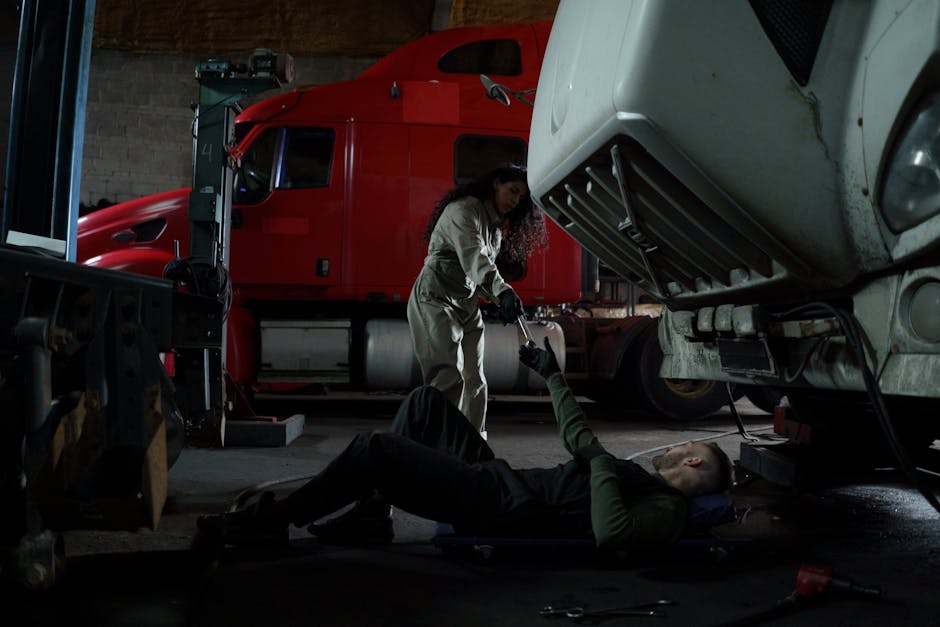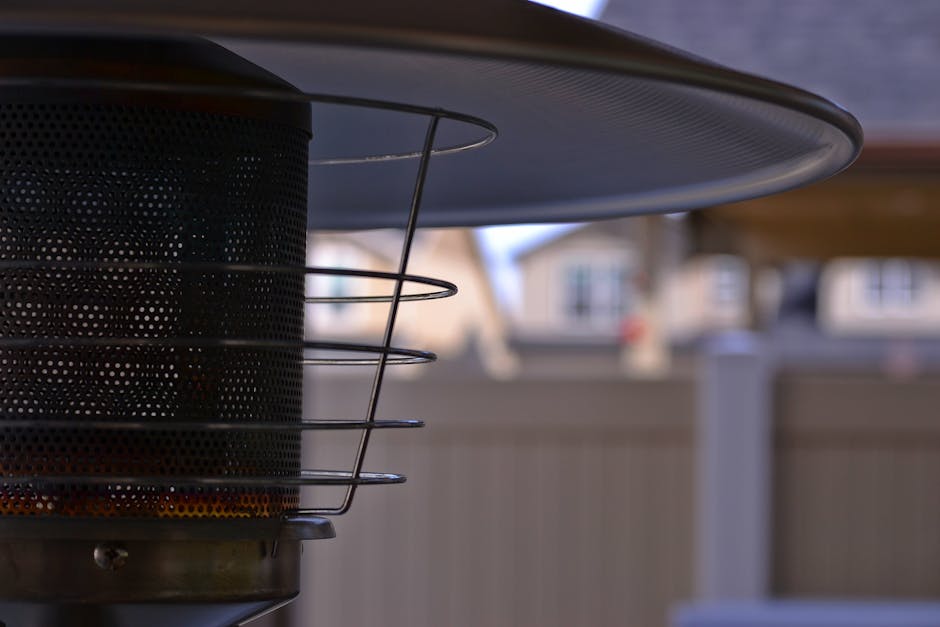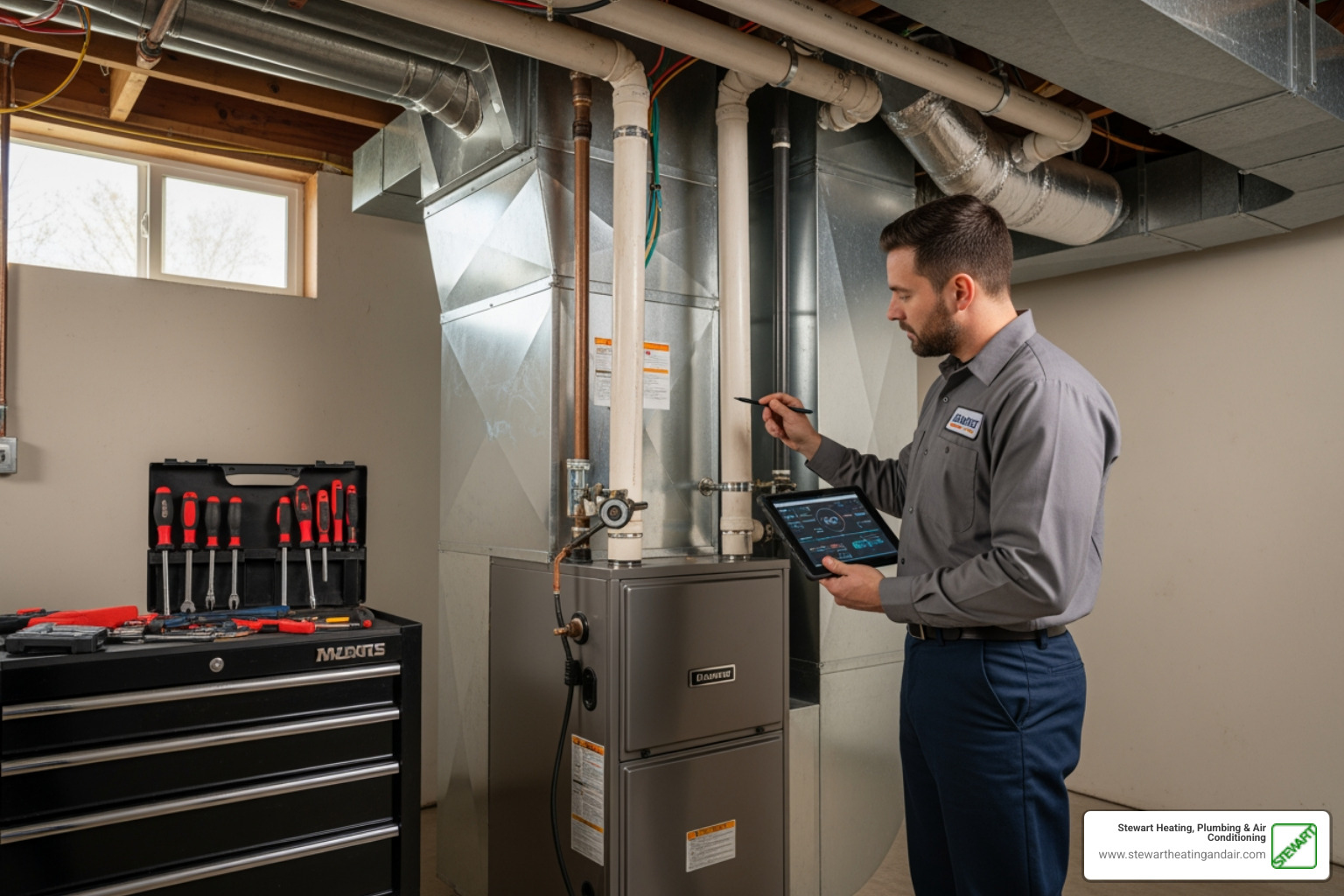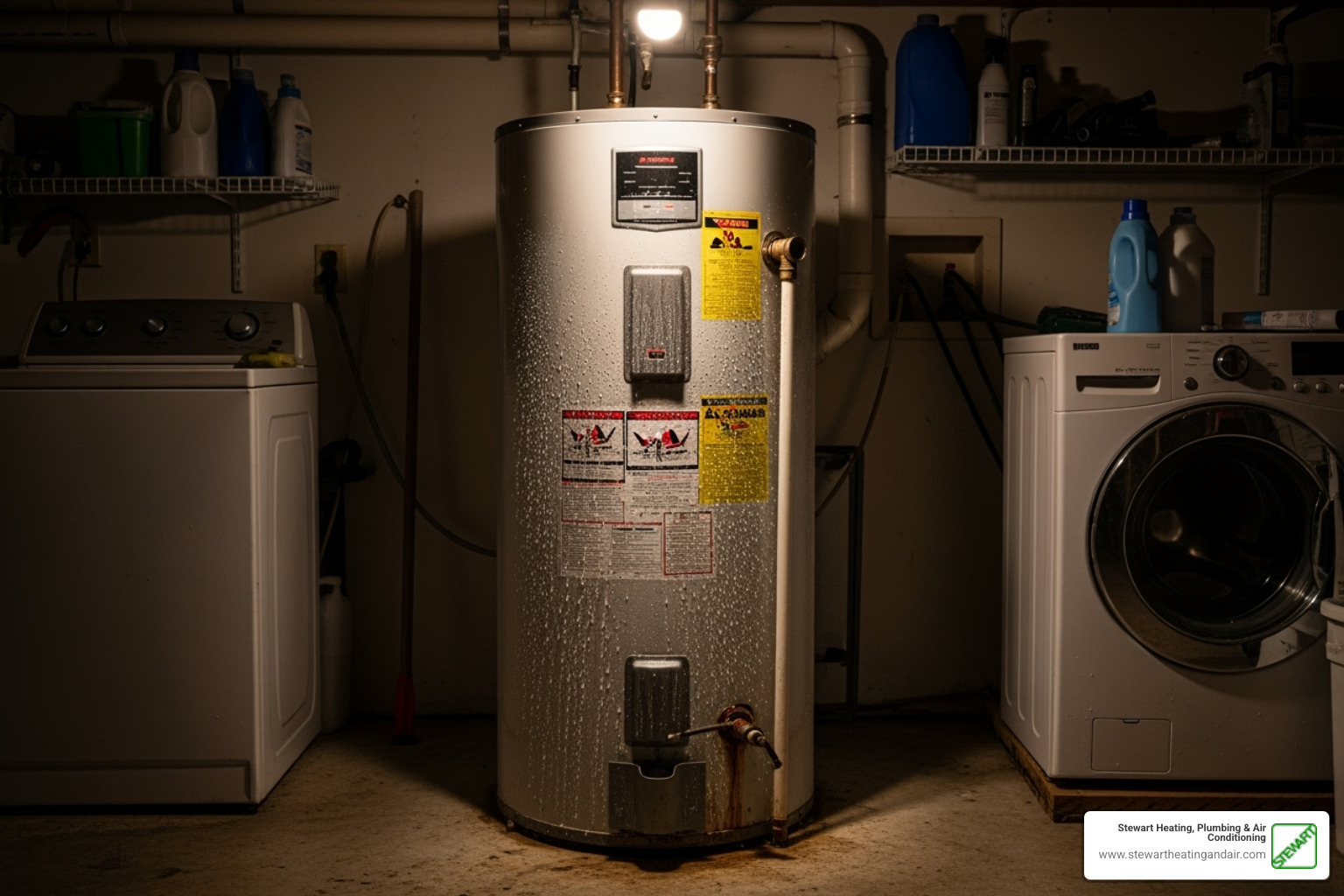
Why Is My Water Heater Not Heating?
A water heater not heating can turn your morning routine into a cold, frustrating experience. An unexpected icy shower is a common problem, as most households use hot water up to 20 times daily for showers, dishwashing, laundry, and cleaning.
Quick troubleshooting steps for a water heater not heating:
- Check the power source - Verify circuit breakers (electric) or gas supply (gas)
- Inspect thermostat settings - Ensure temperature is set between 120-140°F
- Look for tripped safety switches - Reset high-temperature cutoff switches
- Examine pilot light - Relight if extinguished (gas water heaters)
- Test heating elements - Check for continuity with multimeter (electric)
- Assess hot water demand - Verify tank size matches household needs
Most water heaters last 8 to 12 years, and heating problems often signal component failures or maintenance issues. While some fixes are simple DIY tasks, others, especially involving electrical or gas connections, require professional expertise.
The good news is that many heating issues have straightforward solutions. Understanding your water heater's components helps you identify the root cause, from tripped breakers to faulty thermocouples, and know when to call a pro.
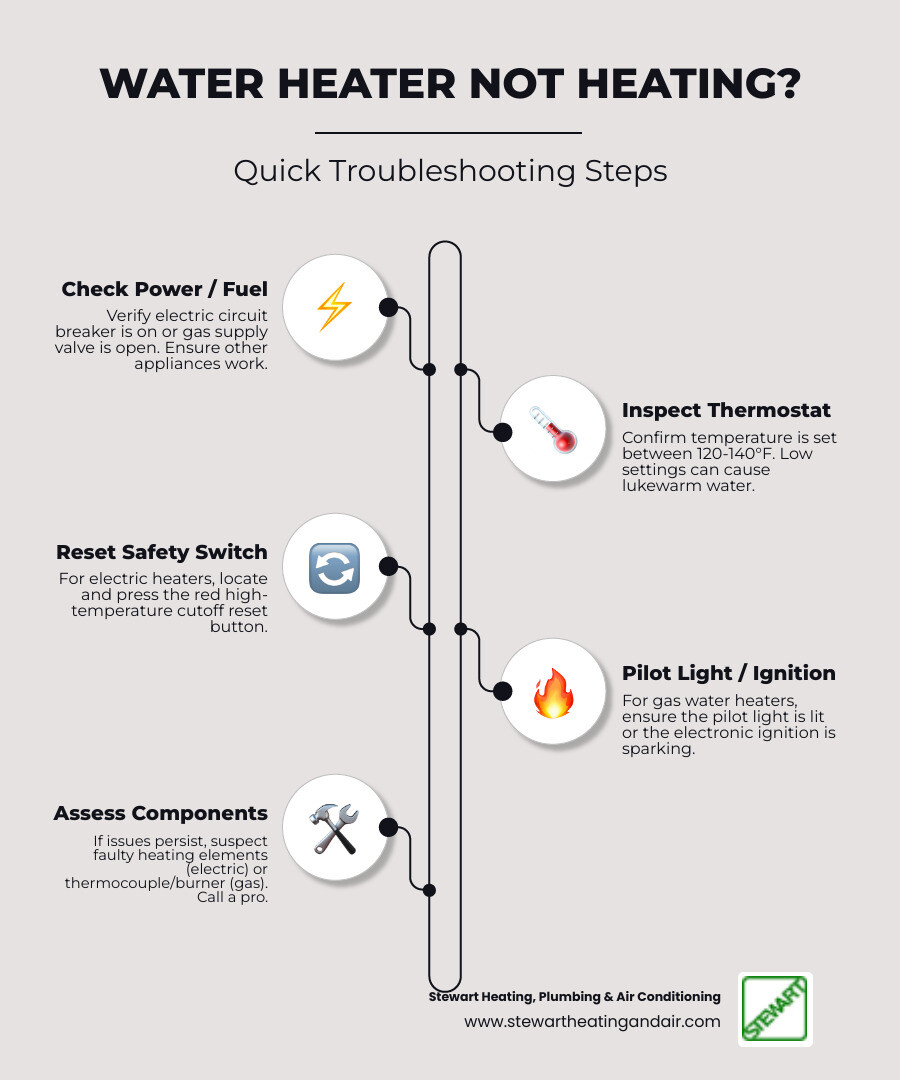
First Steps: Quick Checks for Any Water Heater
When your water heater is not heating properly, don't panic. The solution is often simpler than you think. These basic checks can often solve the problem without a professional call.
First, check your thermostat setting, as it can be accidentally adjusted. Next, consider high hot water demand. If your routine has changed (e.g., more people showering), your heater might be struggling to keep up. The issue could also be an undersized unit; a 40-gallon tank that was fine for two people may not support a family of four. Finally, a malfunctioning mixing valve, which blends hot and cold water, can cause lukewarm temperatures even if the heater is working correctly.
If you're in the Concord area and need expert help with any water heating issues, our team specializes in Water Heaters in Concord, CA and we're here to help.
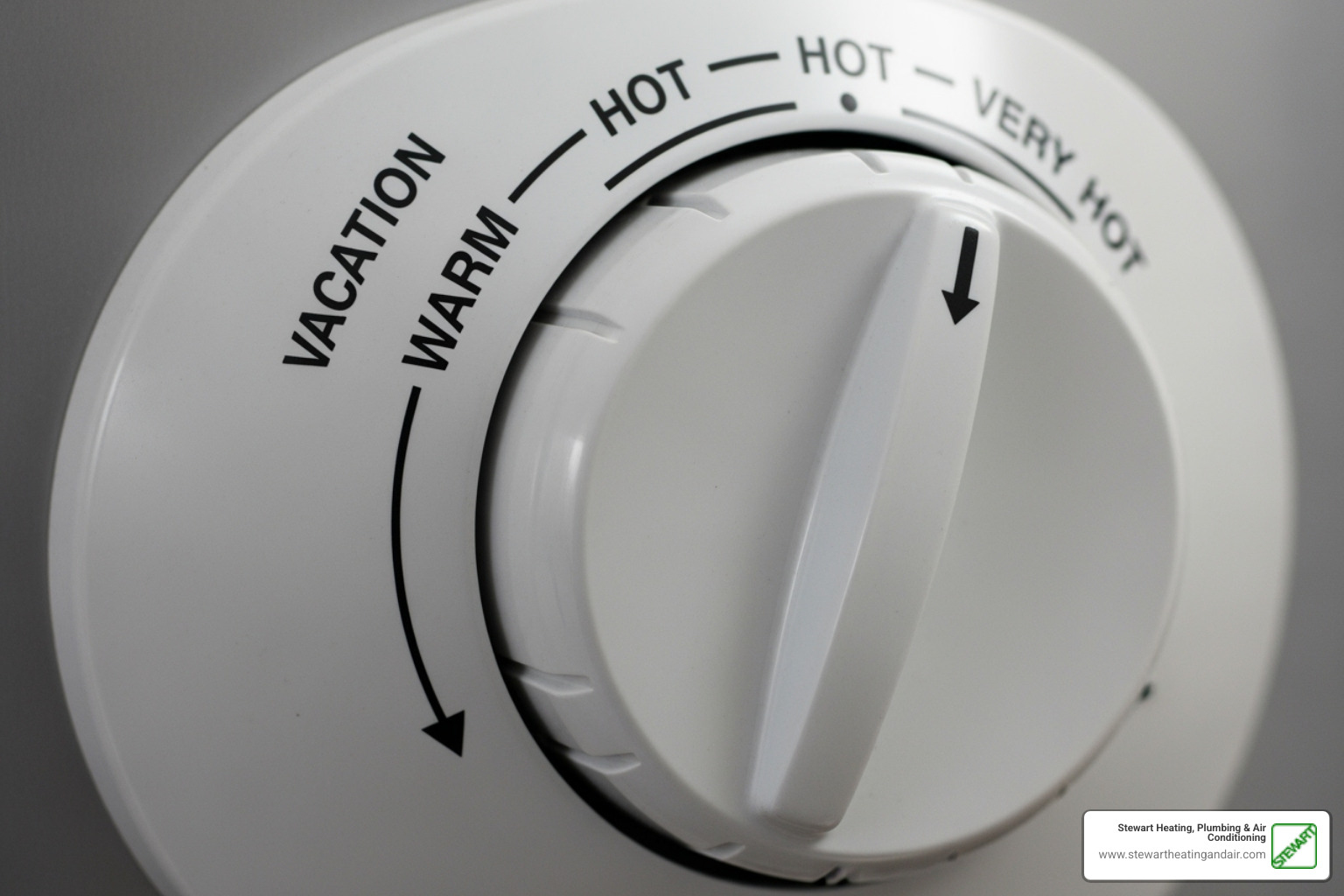
Check the Power or Fuel Source
It may seem obvious, but a water heater not heating is often due to a lack of power or fuel.
For an electric water heater, check for no power at your electrical panel. Find the water heater's circuit breaker (usually a double-pole breaker). If it's tripped, flip it completely off, then back on. If the breaker trips again immediately, stop resetting it and call a professional, as this indicates a larger electrical issue.
For a gas water heater, ensure there's no gas supply issue. Confirm the gas valve on the heater is open. Then, check other gas appliances in your home, like the stove. If they also aren't working, you may have a supply problem and should contact your utility company.
Safety first: If you smell gas (a rotten-egg odor), evacuate your home immediately without using any electronics or light switches. Call your gas company and emergency services from a safe distance.
Check the Thermostat Settings
The thermostat setting is crucial for comfort and safety. The recommended temperature is 120-140 degrees Fahrenheit. The Department of Energy recommends a setting of 120°F to balance efficiency and safety.
A setting below 120°F poses a Legionella risk, as it can allow harmful bacteria to grow. Conversely, a setting above 140°F creates a scalding risk, which is especially dangerous for children and the elderly.
After adjusting the thermostat, wait 30-60 minutes for the water to reach the new temperature.
Troubleshooting Your Electric Water Heater Not Heating
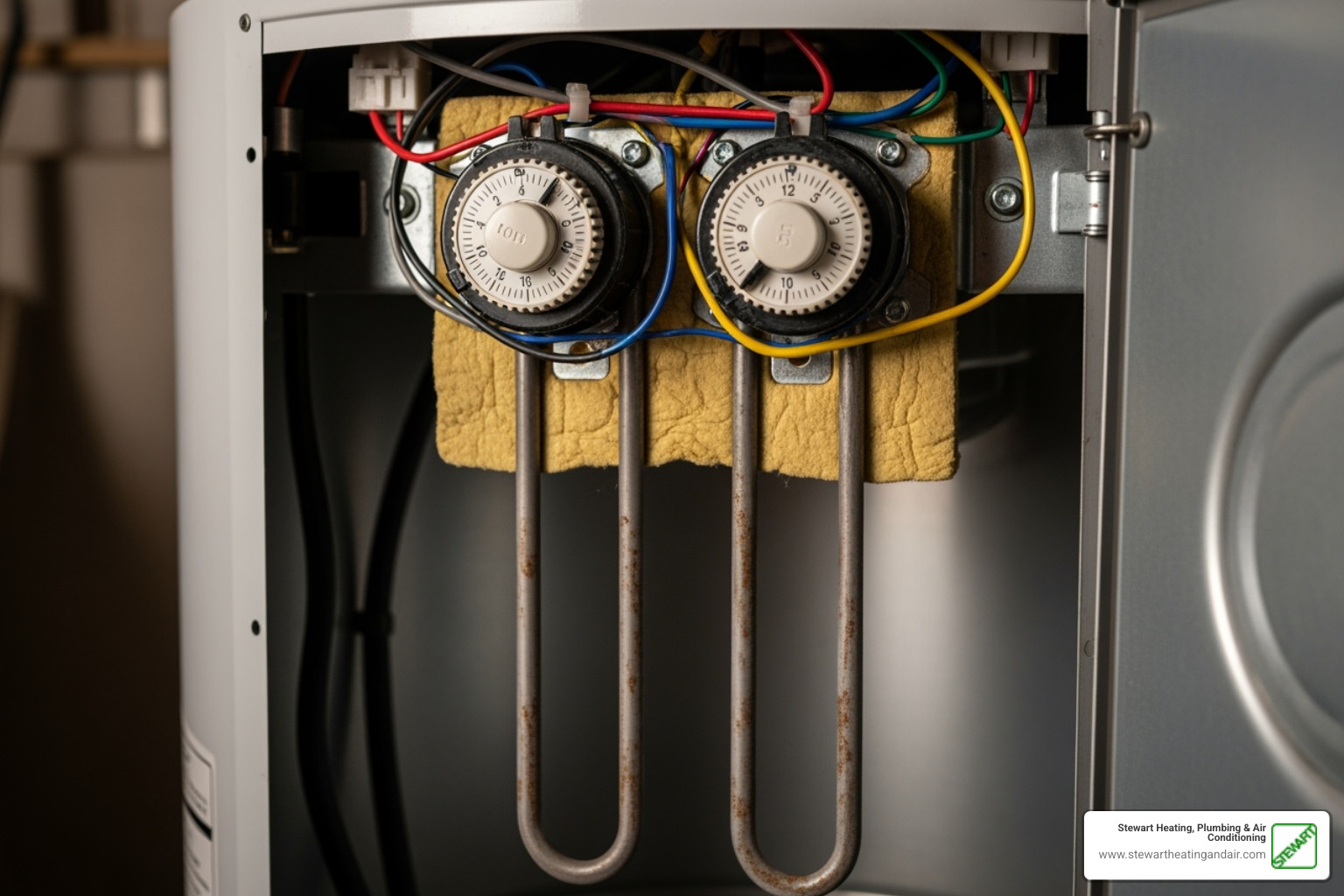
Electric water heaters use heating elements—large coils submerged in the tank—to heat water. When an electric water heater is not heating, the cause is typically an electrical problem. Most units have two elements: an upper one that heats first and a lower one that finishes the job. If either fails, you'll have heating issues.
Safety First: Electric water heaters use 240 volts, which can be lethal. Always turn off the power at the circuit breaker before opening any access panels or touching components. Your safety is paramount.
My electric water heater is not heating: What to check first
When your electric water heater is not heating, start at the electrical panel.
Check for a tripped circuit breaker. Find the double-wide breaker for your water heater. If it's tripped (in the middle or "off" position), reset it by pushing it fully to "off" and then back to "on." If the breaker trips again immediately, stop and call a professional, as this signals a serious electrical fault.
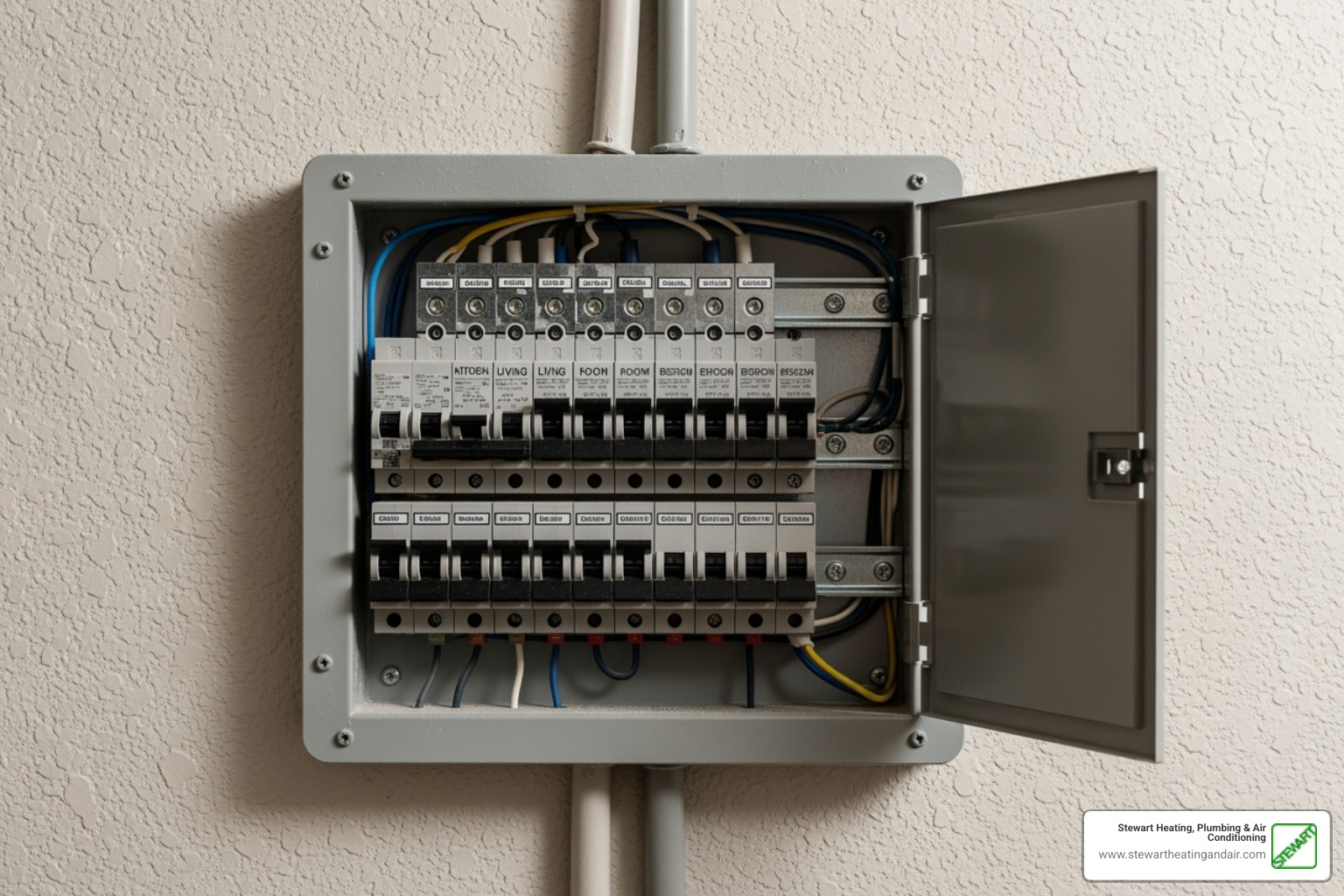
If the breaker is fine, check the high-temperature cutoff switch. This safety device shuts off power if the water gets too hot. Located behind the upper access panel, it has a small red reset button. Press it firmly. If it clicks, it has been reset. If this switch trips again, it indicates an overheating problem that needs professional diagnosis.
Signs of a Faulty Heating Element or Thermostat
If breakers and safety switches are fine, the issue may be a faulty heating element or thermostat. The symptoms can point to which component has failed.
- No hot water at all usually points to a problem with the upper heating element or its thermostat. The upper element must work for the lower one to activate.
- Lukewarm water or hot water that runs out quickly suggests the lower heating element has failed. The upper element heats some water, but the lower one isn't finishing the job.
Testing with a multimeter can confirm a bad element, but this should only be done with the power off and by someone comfortable with electrical work. A good element has a resistance of 10-30 ohms. No reading means it's broken; a reading to the tank's metal housing indicates a dangerous short.
Other signs of failing components include popping sounds, frequent breaker trips, visible burn marks, inconsistent water temperatures, and higher electricity bills. Working with 240-volt systems is dangerous. If you're in doubt, call a professional. We provide expert service for Electric Water Heaters in Concord, CA and throughout Contra Costa County.
Troubleshooting Your Gas Water Heater
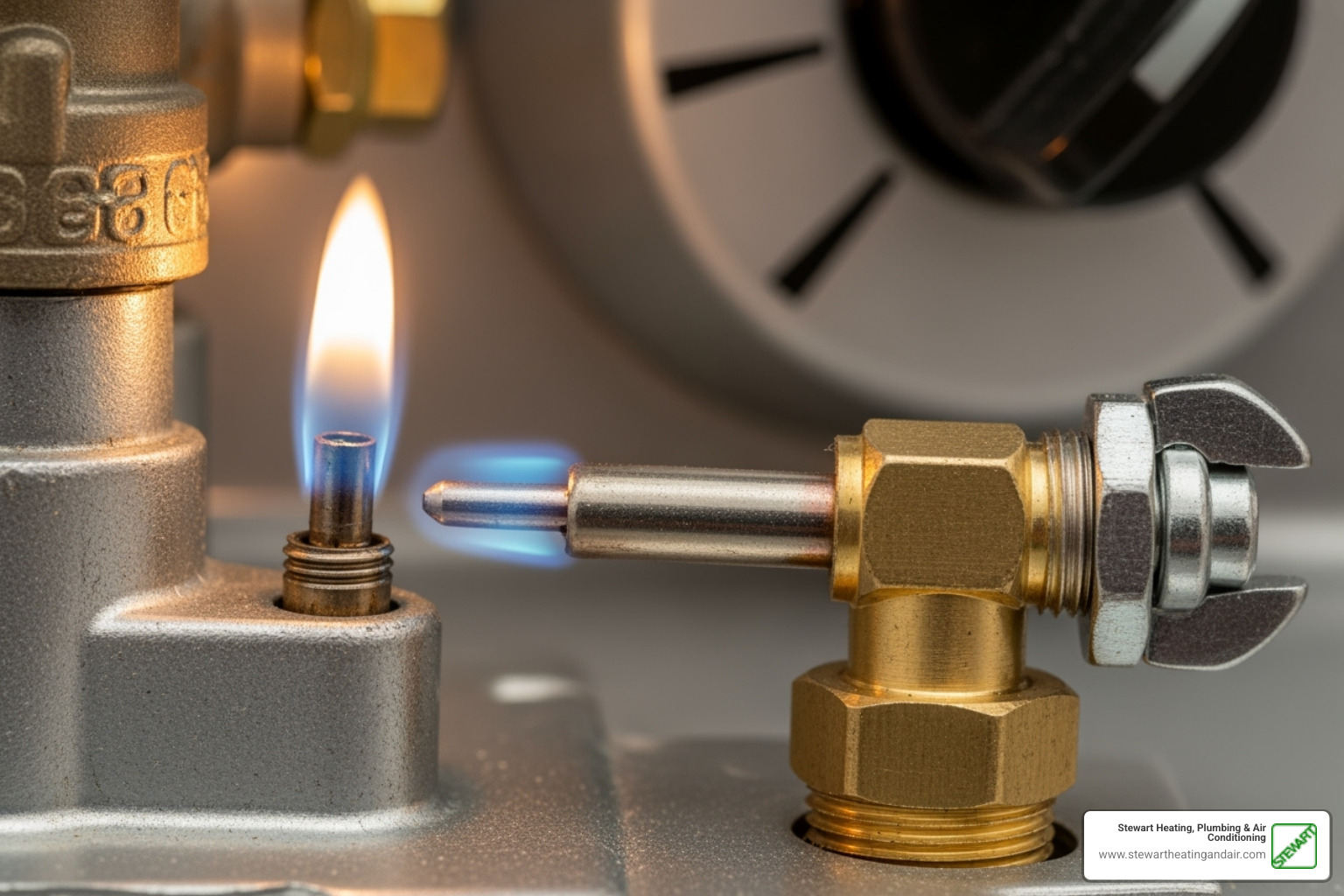
Gas water heaters use a burner to heat water. When a gas water heater is not heating, the problem usually involves the gas supply, pilot light, or burner. While some fixes are simple, gas safety precautions are critical.
If you smell gas (a rotten-egg smell), follow this evacuation procedure immediately: leave your home, do not use any electronics or light switches, and call your gas company and emergency services from a safe location outside. Do not take any risks with a potential gas leak.
Why is my gas water heater not heating? The Pilot Light and Gas Supply
After confirming there's no gas leak, check the pilot light. A pilot light that is out is the most common reason a gas water heater is not heating. The pilot is a small, constant flame that ignites the main burner.
Relighting the pilot is often simple; follow the instructions on the unit or consult a guide like this one on how to relight a pilot light. If the pilot won't stay lit, there's a deeper issue, such as a faulty thermocouple.
Also, check for gas valve issues. Ensure the gas control valve on the heater is "on" and that your home's main gas valve is open. Inspect the gas supply line for kinks or damage. If other gas appliances are also out, call your utility company. For professional help, we service Gas Water Heaters in Antioch, CA and the surrounding areas.
Thermocouple and Burner Assembly Issues
If the pilot light won't stay lit or the main burner won't ignite, the problem is likely the thermocouple or burner assembly.
A faulty thermocouple is a very common issue. This safety device sits in the pilot flame and signals the gas valve to stay open. If it fails or is dirty, it won't generate the right signal, and the gas valve will shut. A dirty thermocouple can sometimes be cleaned with fine sandpaper, but if it's damaged or worn, it needs replacement.
A clogged burner assembly is another frequent problem. Debris can block the burner ports, preventing proper ignition or causing inefficient burning. Check the flame color when the burner is on. A healthy flame is a strong blue flame. A yellow flame vs. blue flame indicates incomplete combustion, which can be caused by a dirty burner. This is a safety issue, as it creates a carbon monoxide risk. If you see a yellow flame, turn off the unit and call a professional immediately. Ensure you have working carbon monoxide detectors in your home.
Common Problems for All Water Heaters and When to Call a Pro
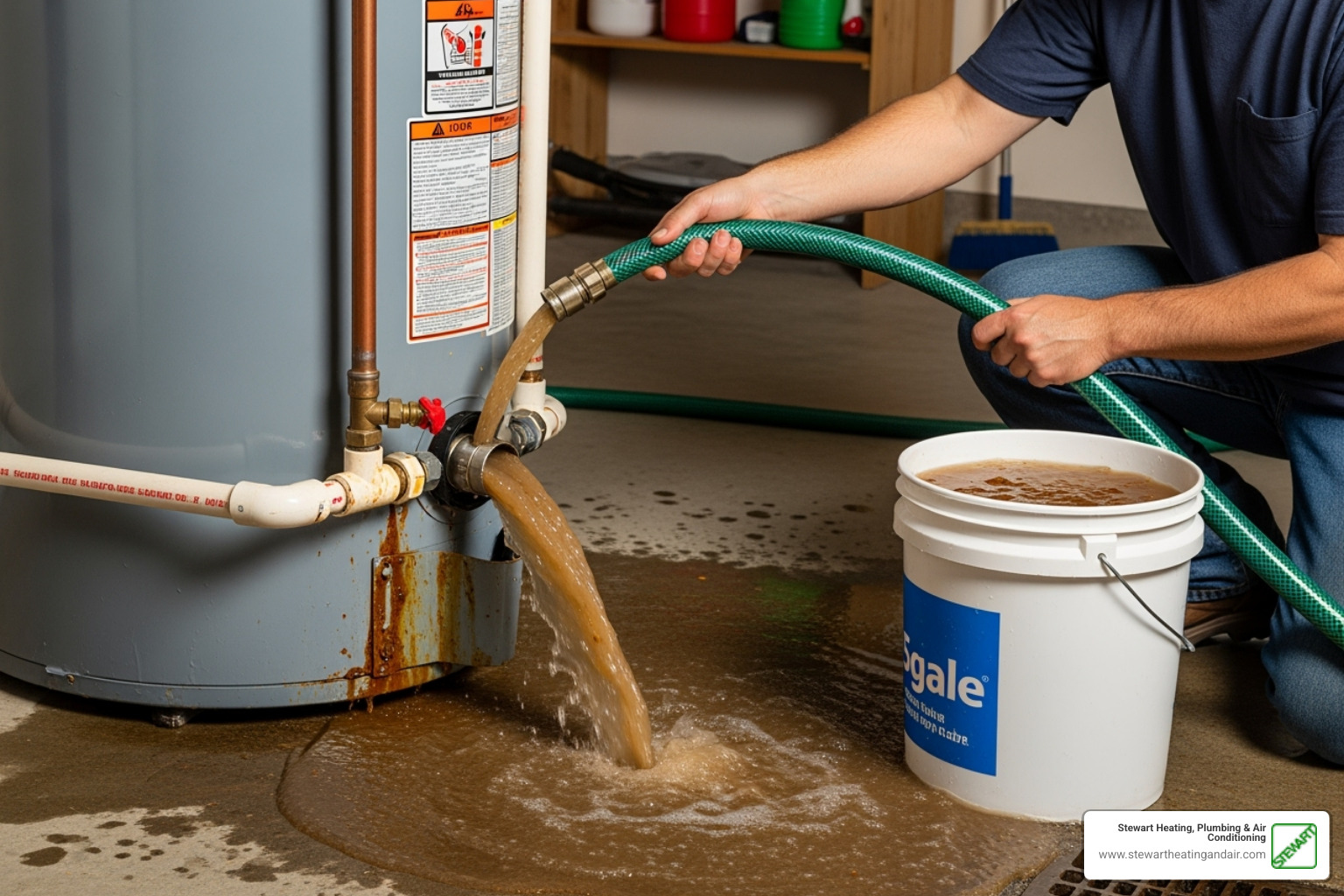
Some problems affect both gas and electric water heaters, often indicating general wear or lack of maintenance. If your water heater is not heating, it could be due to these common issues. Proactive maintenance, like annual flushing, extends your unit's life and prevents major problems. It's also important to recognize the signs of an aging water heater (8-12+ years old, frequent repairs, rusty water) to decide between repair and replacement.
Leaks, Noises, and Smells
Pay attention to strange sounds, leaks, or odors from your water heater.
Common water heater noises and their likely causes:
- Popping or banging: Sediment buildup at the bottom of the tank.
- Hissing or sizzling: A small water leak hitting a hot surface or scale on electric elements.
- Ticking or tapping: Normal thermal expansion in pipes.
- Crackling: Sediment on heating elements (electric) or the burner (gas).
- Water hammer: A loud bang in the pipes when a faucet is shut off quickly, caused by water pressure shockwaves.
A leaking tank is a critical issue, usually meaning the tank has corroded and must be replaced. If you see water pooling at the base, shut off the water and power/gas and call a professional. A leaking T&P valve (Temperature and Pressure Relief) is a safety concern that could indicate excessive pressure or a faulty valve.
Discolored or smelly water can also signal problems:
- Rusty water: A sign of tank corrosion, likely from a depleted anode rod.
- Rotten-egg smell: Caused by bacteria in the tank. Flushing may help, but professional service might be needed.
Regular maintenance prevents most of these issues. We offer complete Water Heater Maintenance in Concord, CA to keep your unit in top shape.
The Impact of Sediment, Scale, and Corrosion
Sediment, scale, and corrosion are three major threats to your water heater's efficiency and lifespan.
Sediment buildup from minerals settling in the tank bottom insulates the water from the heat source. This reduces efficiency, raises energy bills, and causes popping noises. Regular flushing the water heater is the solution.
Mineral scale (limescale) from hard water coats heating elements, pipes, and valves, reducing heat transfer and restricting water flow. This is a major issue for both tank and tankless models.
Corrosion will eventually destroy the steel tank. Water heaters include a sacrificial anode rod that corrodes to protect the tank. This rod must be inspected and replaced every 3-5 years. Tank corrosion signs include rusty water and leaks. A tank leaking from corrosion cannot be repaired and requires replacement. If you see these signs, we can help with Water Heater Replacement in Concord, CA.
Frequently Asked Questions about Water Heater Problems
When a water heater is not heating, homeowners often have the same questions. Here are answers to some of the most common ones to help you make informed decisions.
How often should I flush my water heater?
We recommend annual flushing for most water heaters to remove sediment buildup, which improves efficiency and reduces noise. If you have hard water, as is common in Contra Costa County, flushing every six months is better. While DIY steps exist, a professional service is safer and more thorough. A pro can also inspect your unit for other potential issues during the service.
How do I know if my water heater needs to be repaired or replaced?
Deciding between repair and replacement depends on a few factors:
- Age of unit: Most tank water heaters last 8 to 12 years. If your unit is in or beyond this range, replacement is often the smarter choice.
- Frequency of repairs: If you're constantly calling for service, the repair costs can quickly exceed the value of a new, reliable unit.
- Leaking tank: A tank leaking from corrosion cannot be repaired and must be replaced. Rust-colored water is another major red flag indicating severe internal corrosion.
As a rule of thumb, if a repair costs more than 50% of a new unit's price, or if your heater is old and inefficient, replacement is the most cost-effective solution.
What's the difference between troubleshooting a tank vs. a tankless water heater?
Troubleshooting differs significantly between tank and tankless models.
Tank-style water heaters store a large volume of water. When a water heater is not heating, problems usually involve heating elements, thermostats, pilot lights, or sediment in the tank.
Tankless water heaters heat water on demand and have unique issues:
- Mineral buildup (scale): This is their biggest enemy, especially with hard water. It clogs the heat exchanger and requires annual descaling.
- Ignition failure: The unit may fail to fire up due to gas supply issues, a faulty igniter, or a blocked vent.
- Overloaded system: A tankless unit can only heat so much water at once. Running too many hot water appliances simultaneously can result in lukewarm water.
- Cold water sandwich: A brief slug of cold water can occur when you quickly turn a hot water tap off and on again.
Modern tankless units often display error codes to help diagnose problems. For expert service on these systems, contact us for Tankless Water Heater Repair in Concord, CA and throughout the region.
Still Have No Hot Water? Contact the Experts
If you've tried the troubleshooting steps in this guide and your water heater is still not heating, it's time to call in the experts. There are clear DIY limitations when it comes to electrical and gas safety risks. Working with 240-volt electricity or natural gas lines is dangerous without proper training and can lead to fire, explosion, or electrocution.
When to call a professional is a matter of safety. Contact us immediately if you:
- Smell gas
- Have a circuit breaker that keeps tripping
- See water pooling around your tank
- Have tried all the basic fixes with no success
These are signs of serious problems that require professional diagnostic tools and expertise. If your water heater is over 8 years old, replacement might be more cost-effective than another repair.
At Stewart Heating, Plumbing & Air Conditioning, we pride ourselves on quality workmanship and customer satisfaction throughout Contra Costa County. Don't let a broken water heater disrupt your life.
For expert diagnosis and safe, reliable solutions, schedule your Water Heater Repair in Concord, CA today. We're here to bring the warmth back to your home.

